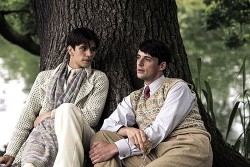Why anyone thought it necessary to make another Brideshead Revisited is a mystery. The fondly regarded 1981 British television miniseries should have been the last word on Evelyn Waugh’s elegy to friendship, art, aristocracy and religion in Edwardian England.
And yet the urge to revisit classic literature cannot be restrained. As Anthony Andrews, who portrayed Sebastian Flyte in the ’81 series, remarked, “Remakes are often an excuse to associate young movie stars with a good title. They think it adds up to magic.”
The new adaptation, directed by Julian Jarrold (Kinky Boots, Becoming Jane) and written by Jeremy Brock and Andrew Davies, is anything but magical. It’s a flat-footed, CliffsNotes condensation that strips every last bit of wit from Waugh’s novel and leaves the bare bones to rattle about onscreen for two and a quarter hours. It’s like a bad term paper by a student who only skimmed the book.
Although the semi-autobiographical Brideshead Revisited: The Sacred & Profane Memories of Captain Charles Ryder is Waugh’s most famous novel, it’s an uncharacteristically serious and florid work by a writer better known for lean, savage satire. Waugh wrote in letters that it was written during “a bleak period of present privation and threatening disaster” — 1944 and 1945 — “and is infused with a kind of gluttony, for food and wine, for the splendours of the recent past, and for rhetorical and ornamental language which now, with a full stomach, I find distasteful.”
Some critics found other elements distasteful, particularly the religious component. Waugh converted to Catholicism in the 1930s, and the novel reflects his conservative views on religion — ideas that led George Orwell to note that Waugh was “about as good a novelist as one can be while holding untenable opinions.” Brideshead’s protagonist, Charles Ryder, is enthralled by his friend’s noble and devoutly Catholic family, and by novel’s end has apparently adopted their faith.
The story is told from the point of view of Charles, an aspiring painter from a modest London background, who forms an intimate friendship with the charmingly childlike Sebastian while both are students at Oxford. Together they indulge liberally in wine and food, and bask in a carefree prewar idyll.
Sebastian, a free spirit who carries around a cherished teddy bear named Aloysius, invites Charles to Brideshead, his majestic family estate, and Charles is enthralled by Brideshead’s beauty and the aristocratic family’s fealty to their demanding faith. Sebastian, haunted by his imperious mother, Lady Marchmain, descends into alcoholism. Years later, Charles becomes romantically involved with Sebastian’s sister, Julia, while both are married to other people. Their marriage plans are doomed by Julia’s unwillingness to renounce her faith.
The story is complex, but the film chooses disastrously to reframe it as a romance, exaggerating the affair between Charles (Matthew Goode) and Julia (the beautiful Hayley Atwell), and inventing a jealous love triangle involving Charles, Sebastian and Julia that didn’t exist in the book.
The casting is also problematic. Waugh describes Sebastian as “magically beautiful, with that epicene quality which in extreme youth sings aloud for love and withers at the first cold wind.” In the TV serial, Anthony Andrews was a charismatic Sebastian alongside Jeremy Irons’ Charles. In the movie, Ben Whishaw makes the character annoyingly effeminate. If Charles seems to forget about Sebastian in the second half — a source of regret in the novel — with this Sebastian it’s understandable, as the viewer might like to forget him too.
The film makes scant use of the novel’s fine prose, choosing to substitute its own clunky writing for Waugh’s words. Where are the famous “six black Cordelias” Sebastian’s little sister has named after her by sending “five bob to some nuns in Africa”?
Goode is a serviceable Charles, but without the author’s narration, the character is a cipher. The rest of the cast, including Emma Thompson as Lady Marchmain and Michael Gambon as Lord Marchmain, don’t fare much better with the lackluster script. Adapting literature is always problematic; good books, as a rule, make bad movies. If you want to revisit Brideshead, you’d do well to watch DVDs of the old TV series, or better, read the book.
Brideshead Revisited Opens Friday at the Cedar Lee Theatre










